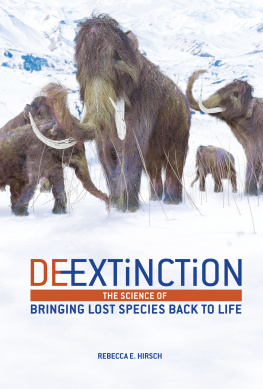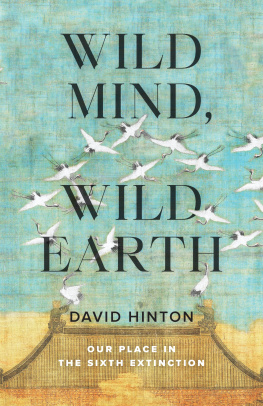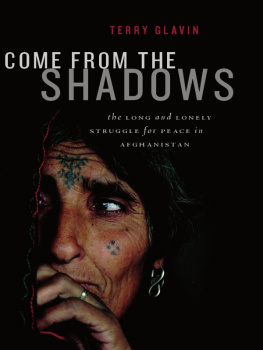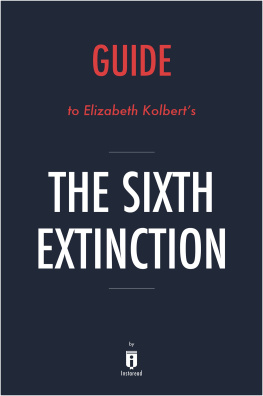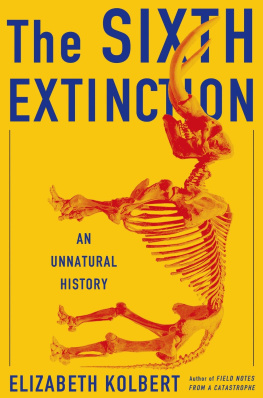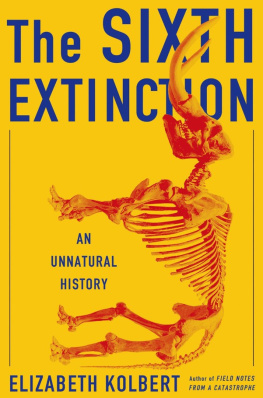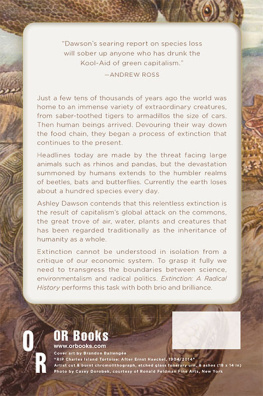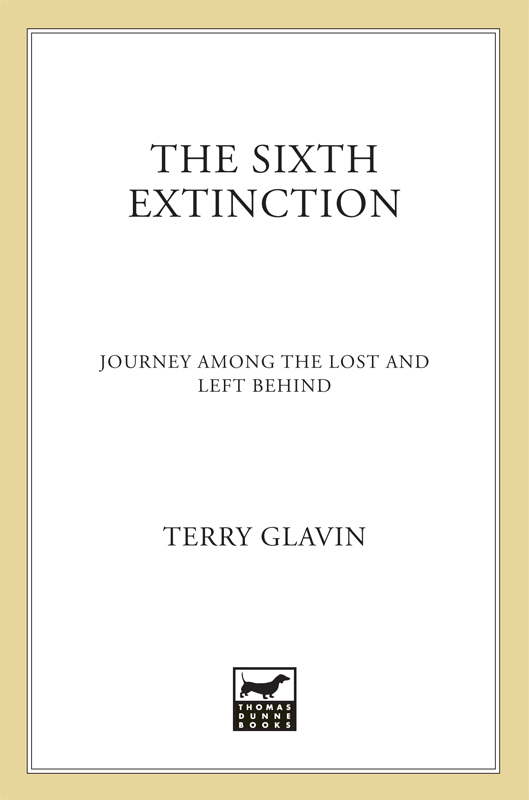Contents
Guide

The author and publisher have provided this e-book to you for your personal use only. You may not make this e-book publicly available in any way. Copyright infringement is against the law. If you believe the copy of this e-book you are reading infringes on the authors copyright, please notify the publisher at: us.macmillanusa.com/piracy.
Contents
A village
A tiger
A bird
A fish
A lion
A whale
A flower
A world
A god
This book is dedicated to Vicky Husband, conservation chair of the Sierra Club of British Columbia, one of Canadas greatest conservationists, and a dear friend. This book is also dedicated to the millions of people all over the world who continue in the struggle to strengthen the things that remain.
Everything one writes now is overshadowed by this ghastly feeling that we are rushing towards a precipice and, though we shant actually prevent ourselves or anyone else from going over, must put up some sort of a fight.
George Orwell, in a letter to Cyril Connolly, December 14, 1938
Acknowledgments
I owe a great debt to my family for their patience and humourmy wife, Yvette, and my children, Zoe, Eamonn, and Conall. I especially thank Robert Harlow and Ben Parfitt for helping me with some difficult parts of the manuscript. Penguins Susan Folkins was a marvellous and patient editor, and my agent, Jackie Kaiser, stood with me through it all. I owe the British Columbia Arts Council my gratitude for its early support, and I particularly thank Louise Pedersen for going beyond the call of duty as a research assistant when we were getting this project off the ground. Small portions of this book have appeared in essay form in The Vancouver Review, Canadian Geographic, The Georgia Straight, and Adbusters, and I thank the editors of those magazines for allowing me to test some of the ideas that have ended up in these pages.
In Ireland, my cousin Christine Gurnett provided far more insight than she will ever know. My old friend Marc Edge made me feel at home in Singapore. Janice D. Boyd, president of Amigos de las Aves USA, pointed me toward the macaws at the Cur refuge in Costa Rica, and Greg Matuzak welcomed me there. Without Dave Martin and Xan Augerot at the Wild Salmon Center in Portland I would never have made it to Russia, and without Vera Kharbergers gifts as a translator I would have been hopeless there. In the Lofotens, the Frovik and Bendiksen families of Reine showed me great kindness, as did the Ramberg family at the Lofoten Sjhus og Rorbuer in Sorvagen.
For The Ghost of the Woods, David Parker of Port Alice was especially generous with his time, and his help is deeply appreciated, given the pain of reliving the cougar attack. The University of Arizonas Paul Beier, Nova Scotia wildlife officer Mark Pulsifer, David Shackleton of the University of British Columbia and his graduate students, and British Columbia wildlife biologist Doug Janz and conservation officer Gerry Brunham were particularly helpful in assembling background information for that chapter.
Mark Lauckner, Tina Farmilo, Jennifer Iredale, and Brian Brett were very gracious in helping to assemble research materials about food-crop diversity. The staff at the Economic Botany collections at the Royal Botanical Gardens at Kew were especially helpful.
In Nagaland, I am forever indebted to the cleric and theologian Reverend C. Walu Walling of Impur; General Jimmy Singh and the staff at Gurudongma; Neisatuo Keditsu, president of the Nagaland Tourism Association; Kevi Meyase of the Army of Khonoma; my comrades, translators, and guides Khrienuo Kense, Bilong Nagi, and Visevor Nagi, as well as Ao Naga folklorist and singer Sangyusang Pongener. Alec Coupe, a linguist at Australias La Trobe University, took time out of his busy schedule to help me understand the hidden song language known to Ao speakers.
And lastly, my thoughts are always with Sibu Das, of Calcutta, and his family.
A village
Prologue
The Valley of the Black Pig
This is a book about extinctions. It was written at the harsh dawn of an epoch that is coming to be called the Sixth Great Extinction. It is a time without parallel in the sixty-five million years that have passed since the end of the Cretaceous period.
Roughly thirty-four thousand plants, or 12.5 percent of all the plants known to science, are threatened with extinction. One in eight bird species is similarly threatened, along with one in four mammals, one in three of all known amphibians, four of every ten turtles and tortoises, and half of all the surveyed fish species in the worlds oceans, lakes, and rivers. Perhaps a million of our fellow species are trailing wearily toward that final cliff edge. We lose a distinct species, of one sort or another, every ten minutes.
These tabulations constitute only the most crude sort of barometer of the great unraveling of the living world; the ecologists who calibrate extinction rates readily admit this. The greatest bleeding away of diversity is in fact occurring well below the level of what geneticists and taxonomists consider a species. It is also happening outside that category entirely. It is happening down where the true measure of lifes diversity is found. Extinction is taking away the subspecies, the local population, the particular, the neighborhood, the singular, and the specific.
And it is not confining itself to the wild things of the world. It is also carrying away the tamedthe functions of artificial selection. Estimates of the number of the worlds vegetable varieties lost during the twentieth century run as high as thirty thousand, with one vanishing every six hours. Of the thousands of apple varieties in North American orchards at the beginning of the twentieth century, for instance, all but one-seventh are gone. Of 2,683 pear varieties, only slightly more than one tenth remain. By the 1970s, most of what remained of Europes old vegetable varieties were threatened with extinction. Even livestock breeds are disappearingEurope lost half its distinct breeds during the twentieth century. Of those that are left, 43 percent are close to oblivion.
Humanitys diversity is similarly withering. Though the world population has surpassed six billion, it is as though some savage ethnic cleansing is underway. The world is losing an entire language every two weeks. Fully half of the worlds five thousand languages are expected to be gone, with all their songs and sagas, by the middle of this century. We are losing religious and intellectual traditions, entire bodies of literature, taxonomies, pharmacopias, and all those ways of seeing, knowing, and being that have made humanity so resilient and successful a species for so long. This is not what we had come to expect from the promise of the Enlightenment. We are not gaining knowledge with every human generation. We are losing it.
A dark and gathering sameness is upon the world, and the language of environmentalism is wholly inadequate to the task of describing it. It cant even come close. It isnt that environmentalism exaggerates the phenomenon. Its just that it doesnt have the words for it. By environmentalism, I mean that great movement of people and ideas that emerged in the early 1970s, largely as a function of Euro-American liberalism. By the language of environmentalism, I mean not just a narrative template that is overly burdened with outmoded ideas and cultural biases, but language that draws arbitrary distinctions between wilderness and everything else, and that places nature outside of culture.


